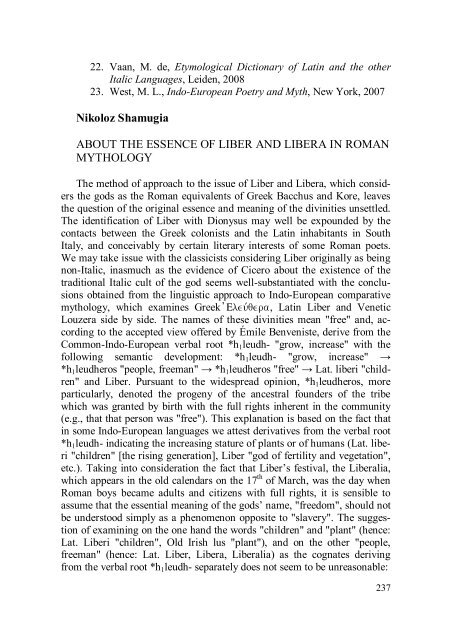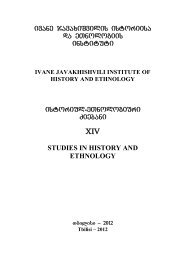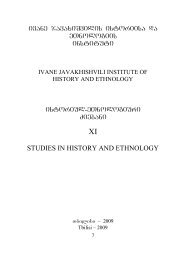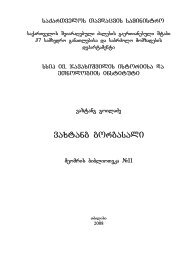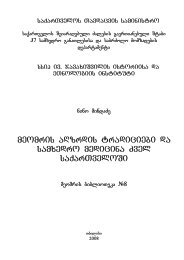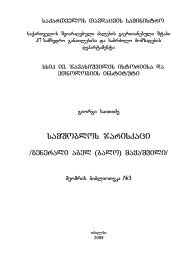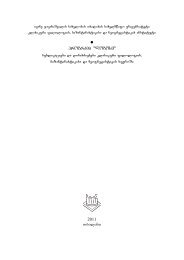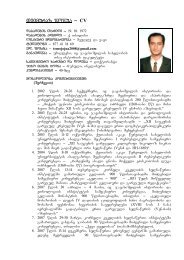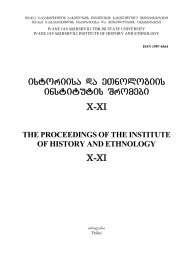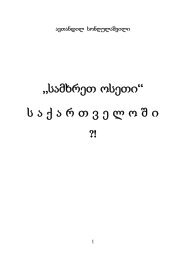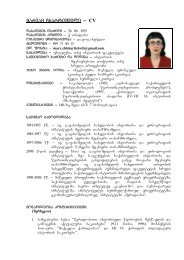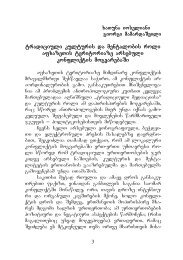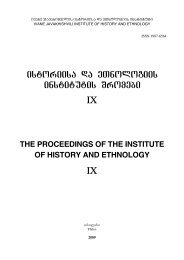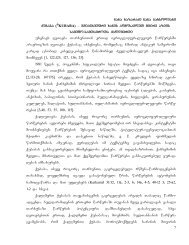236 3. Bellardi, G. (ed.), Le Orazioni di M. Tullio Cicerone, Vol. I, Torino, 1978 4. Benveniste É., Le vocabulaire des institutions indoeuropéennes, Vol. 1. Économie, parenté, société, Paris, 1969 5. Buck, C., A Dictionary of Selected Synonyms in the Principal Indo-European Languages, Chicago, 1949 6. Conway, R. S., "Sull’ Iscrizione Veneta (di co · l · tano · s ·) Trovata in Cadore", Studi Etruschi, vol. 4, 1930, 287-289 7. Conway, R. S., Whatmough, J., Johnson, S. E., The Prae-Italic Dialects of Italy, vol. I, London, 1933 8. Degrassi, A. (ed.), Inscriptiones Italiae, Vol. XIII – Fasti et Elogia, Fasciculus II – Fasti Anni Numani et Iuliani, accedunt Ferialia, Menologia Rustica, Parapegmata, Roma, 1963 9. Gamkrelidze, Th., Ivanov, V. V., Indo-European and the Indo- Europeans, Part I (the Text), English version by Johanna Nichols, Berlin - New York, 1995 10. Latte, K., Römische Religionsgeschichte, München, 1960 11. Mallory, J. P. and Adams, D. Q. (eds.), Encyclopedia of Indo- European Culture, London and Chicago, 1997 12. Mallory, J. P. and Adams, D. Q., The Oxford Introduction to the Proto-Indo-European and the Proto-Indo-European World, New York, 2006 13. Mann, S., An Indo-European Comparative Dictionary, Hamburg, 1984/87 14. Pokorny, J., Indogermanisches etymologisches Wörterbuch, Band I, Bern und München, 1959 15. Ribbeck, O. (ed.), Tragicorum Romanorum Fragmenta, Hildesheim, 1962 16. Rousselle, R., "Liber-Dionysus in Early Roman Drama", The Classical Journal, Vol. 82, No. 3 (Feb. Mar.), 1987, 193-198 17. Sabbatucci, D., La religione di Roma antica dal calendario festivo all’ ordine cosmico, Milano, 1988 18. Scullard, H. H., Festivals and Ceremonies of the Roman Republic, London, 1981 19. Smith, W. (ed.), A Dictionary of Greek and Roman Mythology, vol. II, London, 2007 20. Steinby, E. M. (ed.), Lexikon Topographicum Urbis Romae, vol. I, A-C, Roma, 1993 21. Usener, H., Götternamen, Versuch einer Lehre von der religiösen Begriffsbildung, Bonn, 1929
22. Vaan, M. de, Etymological Dictionary of Latin and the other Italic Languages, Leiden, 2008 23. West, M. L., Indo-European Poetry and Myth, New York, 2007 Nikoloz Shamugia ABOUT THE ESSENCE OF LIBER AND LIBERA IN ROMAN MYTHOLOGY The method of approach to the issue of Liber and Libera, which considers the gods as the Roman equivalents of Greek Bacchus and Kore, leaves the question of the original essence and meaning of the divinities unsettled. The identification of Liber with Dionysus may well be expounded by the contacts between the Greek colonists and the Latin inhabitants in South Italy, and conceivably by certain literary interests of some Roman poets. We may take issue with the classicists considering Liber originally as being non-Italic, inasmuch as the evidence of Cicero about the existence of the traditional Italic cult of the god seems well-substantiated with the conclusions obtained from the linguistic approach to Indo-European comparative mythology, which examines Greek jEleuvqera, Latin Liber and Venetic Louzera side by side. The names of these divinities mean "free" and, according to the accepted view offered by Émile Benveniste, derive from the Common-Indo-European verbal root *h 1 leudh- "grow, increase" with the following semantic development: *h 1 leudh- "grow, increase" → *h 1 leudheros "people, freeman" → *h 1 leudheros "free" → Lat. liberi "children" and Liber. Pursuant to the widespread opinion, *h 1 leudheros, more particularly, denoted the progeny of the ancestral founders of the tribe which was granted by birth with the full rights inherent in the community (e.g., that that person was "free"). This explanation is based on the fact that in some Indo-European languages we attest derivatives from the verbal root *h 1 leudh- indicating the increasing stature of plants or of humans (Lat. liberi "children" [the rising generation], Liber "god of fertility and vegetation", etc.). Taking into consideration the fact that Liber’s festival, the Liberalia, which appears in the old calendars on the 17 th of March, was the day when Roman boys became adults and citizens with full rights, it is sensible to assume that the essential meaning of the gods’ name, "freedom", should not be understood simply as a phenomenon opposite to "slavery". The suggestion of examining on the one hand the words "children" and "plant" (hence: Lat. Liberi "children", Old Irish lus "plant"), and on the other "people, freeman" (hence: Lat. Liber, Libera, Liberalia) as the cognates deriving from the verbal root *h 1 leudh- separately does not seem to be unreasonable: 237
- Seite 1 und 2:
ivane javaxiSvilis saxelobis Tbilis
- Seite 3 und 4:
ivane javaxiSvilis istoriisa da eTn
- Seite 7 und 8:
sarCevi gamomcemelTagan ...........
- Seite 9 und 10:
Konstantine Pitskhelauri SOUTH CAUC
- Seite 11 und 12:
EDITORIAL On December 30,2008 the g
- Seite 13 und 14:
15. saqarTvelos muzeumis babilonuri
- Seite 15 und 16:
46. К истории древне
- Seite 17 und 18:
74. Изучение древней
- Seite 19 und 20:
антропологических
- Seite 21 und 22:
137. Экономика и внеш
- Seite 23 und 24:
169. Die alten georgischen Staaten
- Seite 25 und 26:
George Mélikichvili LES "GENS DE S
- Seite 27 und 28:
souvent employé dans le même sens
- Seite 29 und 30:
TAPPĪŠU), les biens doivent être
- Seite 31 und 32:
nino abakelia sakraluri xe da misi
- Seite 33 und 34:
analogiuri simboloebi saqarTvelos s
- Seite 35 und 36:
gonari dRis wina saRamos sanTels de
- Seite 37 und 38:
mxedarTa srbola, romelSic monawileo
- Seite 39 und 40:
nadac is aq gardacvlilisTvis Tanamg
- Seite 41 und 42:
nilia erT SemTxvevaSi kelaptriT anu
- Seite 43 und 44:
After bewailing the sign of the dea
- Seite 45 und 46:
space has its own centre in the fac
- Seite 47 und 48:
amdenadac amjerad kvlevis fokusSi q
- Seite 49 und 50:
waulebis aRwerilobebs vxvdebiT. teq
- Seite 51 und 52:
dros "Tamadad" irCevdnen. Zveli ber
- Seite 53 und 54:
Tedo dundua gneus pompeusis portret
- Seite 55 und 56:
magram es jer portreti ar aris. uax
- Seite 57 und 58:
espublika didi xnis mkvdari iyo. Te
- Seite 59 und 60:
levan gordeziani erTi urartuli form
- Seite 61 und 62:
SeiZleba am frazaSi rame azri davin
- Seite 63 und 64:
Manfred Hutter (Bonn) WEISHEIT UND
- Seite 65 und 66:
tar-nu-zi e-ep-zi-[ma ku-e-d]a-ni m
- Seite 67 und 68:
gehört, die von Individuen erwüns
- Seite 69 und 70:
wird als "an Worten geschickte, an
- Seite 71 und 72:
4. "Ein lehrreiches Beispiel will i
- Seite 73 und 74:
sammenhang mit der Weisheit der Gö
- Seite 75 und 76:
Haas, Volkert: 2006. Die hethitisch
- Seite 77 und 78:
Sylvia Hutter-Braunsar (Alfter) BEG
- Seite 79 und 80:
nach Anatolien und Nordsyrien. Notw
- Seite 81 und 82:
528) -, denn in der Inschrift auf d
- Seite 83 und 84:
angeführt wird, könnte es sehr wo
- Seite 85 und 86:
und Nachfolger Argištis, Rusa II.,
- Seite 87 und 88:
sucht (Işık 1995). Er konnte dabe
- Seite 89 und 90:
thitischen Kulturraumes. Güteraust
- Seite 91 und 92:
iums. zogierTi xmovnis zusti warmoT
- Seite 94:
94 garTobis ganmanawileblis sityveb
- Seite 98:
98 leqsi mesame; me damafiqra am si
- Seite 101 und 102:
101
- Seite 103 und 104:
103
- Seite 105 und 106:
105
- Seite 107 und 108:
References: 1. A. Erman, The Litera
- Seite 109 und 110:
kai; e[sths»e¼ mnhmovsu»non¼ mo
- Seite 111 und 112:
Zalian iSviaTad gvxvdeba. momyavs y
- Seite 113 und 114:
giorgi qavTaraZe warmarTuli iberiis
- Seite 115 und 116:
wilSi damkvidrebuli yofila apolonis
- Seite 117 und 118:
iupiter dolixenusis kulti evropaSi
- Seite 119 und 120:
xedroTa (da ara mxolod maTi) RvTaeb
- Seite 121 und 122:
dis saxelwodebisa. somexi mematiane
- Seite 123 und 124:
gvxvdeba iakob xucesis "SuSanikis w
- Seite 125 und 126:
RvTaebebi moixsenieba, rogorc berZn
- Seite 127 und 128:
davsxneT Tavni Cuenni cixeTa da qal
- Seite 129 und 130:
mcire aziaSi adgili unda hqonoda iu
- Seite 131 und 132:
dros gasaTvaliswinebelia am ori RvT
- Seite 133 und 134:
miuxedavad jer sasanianTa iranisa d
- Seite 135 und 136:
mqone RvTaebebisagan Semdgari iberi
- Seite 137 und 138:
Такайшвили 1906-1912 = Е
- Seite 139 und 140:
deities of sun and moon to Iuppiter
- Seite 141 und 142:
samwuxarod, Cven araferi viciT imis
- Seite 143 und 144:
narekvavis goraze, ramdenime sacxov
- Seite 145 und 146:
gureba SeuZlebeli iyo. misi uaryofi
- Seite 147 und 148:
aRmosavleT kuTxeSi "rqebiani sakurT
- Seite 149 und 150:
literatura: 1. m. xidaSeli, araquli
- Seite 151 und 152:
and a chair, too, nearby. The floor
- Seite 153 und 154:
gadakecilia, xolo ukana mxares brin
- Seite 155 und 156:
swored amitomac am mravalferovani d
- Seite 157 und 158:
mZivebis qimiuri Sedgeniloba praqti
- Seite 159 und 160:
5. Licheli V. 1999a, - St. Andrew i
- Seite 161 und 162:
161
- Seite 163 und 164:
163
- Seite 165 und 166:
(g. meliqiSvili, 1965), yuradReba s
- Seite 167 und 168:
axali Sesabamisobebi, daajgufa isin
- Seite 169 und 170:
4. *usx- "samsxverplo xari" [qarT.
- Seite 171 und 172:
"cixe-simagre, qalaqi, baRi", rus.
- Seite 173 und 174:
misi azriT, qarTveluri forma indo-i
- Seite 175 und 176:
wvna". g. klimovma indoevropul Sesa
- Seite 177 und 178:
konstantine ficxelauri Zv.w. II-I a
- Seite 179 und 180:
gamoirCeva. 1 kerZod, ivris zeganze
- Seite 181 und 182:
samxreT kavkasiis centraluri nawili
- Seite 183 und 184:
gionSi, ivris zegnis CaTvliT, jer k
- Seite 185 und 186: kuTrebiT mniSvnelovani adgili uWira
- Seite 187 und 188: leks, heross, kavkass da egross [mr
- Seite 189 und 190: mxarisaTvis ucxo artefaqtebis Semcv
- Seite 191 und 192: 4. cxadia, erTdroulad amdeni damTxv
- Seite 193 und 194: k. k. f i c x e l a u r i (2005), c
- Seite 195 und 196: suraTebis aRweriloba 1. ruka, samxr
- Seite 197 und 198: N1 N2 197
- Seite 199 und 200: N5 N6 199
- Seite 201 und 202: N8 N9 201
- Seite 203 und 204: Mirjo Salvini (Rom) DIE AUSDEHNUNG
- Seite 205 und 206: von Çelebibağı und Hagi (CTU A 1
- Seite 207 und 208: 22 [ x x ] x x x x [ x x x ] 23 [ x
- Seite 209 und 210: "Vs (Z. 1-4) Ḫaldi, [(seinem) Her
- Seite 211 und 212: Ländern selbst. Das klarste Beispi
- Seite 213 und 214: Assurbanipal (669-627) Assurbanipal
- Seite 215 und 216: Abb. 1 215
- Seite 217 und 218: Abb. 3 Abb. 4 217
- Seite 219 und 220: Abb. 7a 219
- Seite 221 und 222: Abb. 8 221
- Seite 223 und 224: Abb. 11 Abb. 12 223
- Seite 225 und 226: Abb. 15 Abb. 16 225
- Seite 227 und 228: Abb. 19 Abb. 20 227
- Seite 229 und 230: ic senatis mier bakqanaliis akrZalv
- Seite 231 und 232: (Zveli berZnuli: plhquv" "brbo, ubr
- Seite 233 und 234: liberaliis daniSnulebis gaTvaliswin
- Seite 235: dacviT Seesabameba rogorc Zvel berZ
- Seite 239 und 240: jemal SaraSeniZe Sumeris saxelmwifo
- Seite 241 und 242: Siac. 13 swored am tipis muSaxelad
- Seite 243 und 244: viZlia ufro Tavdajerebulad vamtkico
- Seite 245 und 246: Jemal Sharashenidze FOR FINDING OUT
- Seite 247 und 248: huiuqis teqstebi, gamoqveynebuli Tu
- Seite 249 und 250: imavdroulad matulobs cnobebi qaSqa
- Seite 251 und 252: surviliT aris gamsWvaluli, mtris da
- Seite 253 und 254: SeiZleba iTqvas Tu ara qaSqur Teoni
- Seite 255 und 256: ogorc Cans, omis RmerTi centralur r
- Seite 257 und 258: iqneb, paragrafis dakarguli marcxen
- Seite 259 und 260: zedmetia imis Tqma, rom istoriuli r
- Seite 261 und 262: giorgaZe uaryofda am Teorias, miiCn
- Seite 263 und 264: Kavtaradze, G.L. 1996. Probleme der
- Seite 265 und 266: Ilya Yakubovich (Chicago) TWO ARMEN
- Seite 267 und 268: nient’ appears to be a derivative
- Seite 269 und 270: the hereto unknown Indo-European la
- Seite 271: Jahukian, Gevorg B. Hayoc’ lezvi


